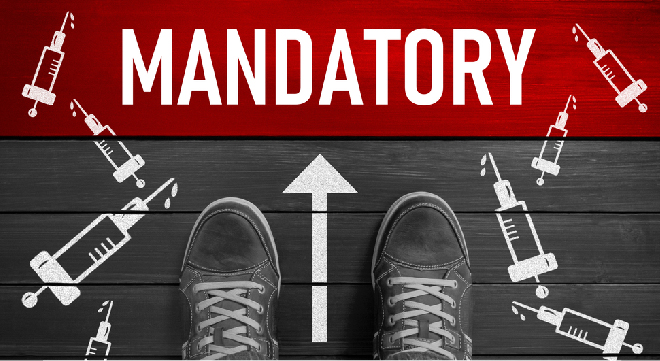The Commission for Conciliation, Mediation and Arbitration (CCMA) decided this month that the dismissal of an employee who refused to be vaccinated was substantively fair.
Daniel van der Merwe, the Eastern Cape manager of the Consolidated Employers Organisation, says the CCMA’s decision and the commissioner’s reasoning provide employers with an indication of how the CCMA and the bargaining councils may reason when deciding the fairness of dismissals related to mandatory vaccination policies (MVPs).
However, as much as the arbitration award in this case provides valuable insights, Van der Merwe says it remains to be seen how the higher courts will reason with regard to balancing individuals’ constitutional rights with the limitations that may be imposed on these rights.
Why the employee sought an objection
The employer in the case, Goldrush, introduced an MVP last year. Employees who could apply for an exemption from the policy.
An employee applied for an exemption on the following grounds:
- Section 12(2) of the Constitution entitles every individual to bodily and psychological integrity.
- She had to waive any form of recourse against pharmaceutical companies in the event of any side effects caused by the vaccination.
- She had at all times during the pandemic observed the rules pertaining to social distancing, etc and had not contracted the virus.
Goldrush declined the employee’s application, saying she was a high-risk individual who interacted with her colleagues daily while on duty in a confined and uncontrollable space, placing those colleagues at risk of infection.
The chairperson of Goldrush’s incapacity enquiry concluded that the employee was permanently incapacitated as a result of her failure to be vaccinated and participate in promoting a safe and healthy working environment.
Goldrush terminated the employee’s contract. She referred a dispute to the CCMA, challenging the substantive fairness of her dismissal.
Dismissal based on incapacity, not operational requirements
Van der Merwe says it is important to keep in mind that the dismissal was based on incapacity and not operational requirements.
The commissioner alluded to the fact that, when dealing with a dismissal for incapacity and having the Code of Good Practice in mind, it is the duty of the employer to establish whether the incapacity is temporary or permanent.
In this case, the commissioner decided that the refusal to be vaccinated constituted permanent incapacity and thus the employer was entitled to dismiss the employee for the same.
It was also important to note from the commissioner’s ruling that the employer draws an inference that the employee, by refusing to be vaccinated in line with the MVP, by implication does not want to participate in the creation of a safe working environment.
In coming to his decision in the current matter, the commissioner also relied on a memo drafted by Judge Roland Sutherland, the Deputy Judge President of the Gauteng High Court, which, as quoted directly from the commissioner’s award, reads as follows:
“There has been as yet only mild protest that this (adopting a no-vaccination-no-entry policy) violates the freedom of choice… In my view, this is the wrong question. The proper question is whether or not an individual is sufficiently civic minded to appreciate that a duty of care is owed to colleagues and others with whom contact is made to safeguard them from harm. If one wishes to be an active member of a community then the incontrovertible legitimate interest of the community must trump the preferences of the individual.”
As the current matter is still novel in nature, it is highly likely that this arbitration award or many more that are sure to come on this topic will find their way to the Labour Court or the Constitutional Court, Van der Merwe says.
“Such courts will undoubtedly develop the law relating to this subject matter in far greater detail and provide employers and employees alike with a better understanding of how MVPs may be implemented and how the balancing of respective rights will be interpreted.”




Quote: “The proper question is whether or not an individual is sufficiently civic minded to appreciate that a duty of care is owed to colleagues and others with whom contact is made to safeguard them from harm. If one wishes to be an active member of a community then the incontrovertible legitimate interest of the community must trump the preferences of the individual.”,
What a load of garbage!
Why do the protected need to be protected from the unprotected by forcing the unprotected to use the protection that did not protect the protected in the first place?
If the vaccine works to prevent infection, those vaccinated have nothing to worry about.
If the vaccine does not prevent infection, the vaccinated are at some risk and the unvaccinated are less likely to choose a vaccine that does not work well.
Vaccination does not prevent an individual getting Covid so vaccinated people get Covid.
Vaccination does not prevent an individual from transmitting Covid so vaccinated people pass Covid to vaccinated and unvaccinated people.
Vaccination is purported to prevent severe infection and hospitalization.
The question is therefore where does an non-vaccinated person carry greater risk for co-workers?
Unvaccinated people are therefore according to science and medical science carrying a personal increased risk of more severe illness and possible hospitalization, which they cannot pass on to a vaccinated person.
This is unconstitutional, even with section 36 giving certain provisions. This is only arbitration and will be challenged in court. Freedom is the right to choose what you put in your body without your livelihood being threatened. This is medical discrimination. If you don’t have to disclose your HIV status, why is this any different? I don’t think that this will hold up.